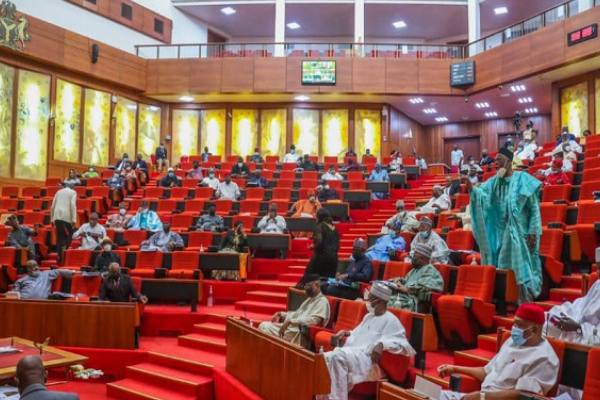The Senate has agreed to provide legislative support for the Central Bank of Nigeria’s proposal to redesign the naira.
The resolution of the Red Chamber followed a motion on the policy by the Chairman of Senate Committee on Banking, Insurance and other Financial Institutions, Senator Sani Uba.
While lawmakers backed the move to redesign the naira, they argued the deadline of Tuesday, January 31, 2023 to deposit all cash in circulation in banks was too short.
[wonderplugin_video iframe=”https://youtu.be/r12DKAGVRlk” lightbox=0 lightboxsize=1 lightboxwidth=960 lightboxheight=540 autoopen=0 autoopendelay=0 autoclose=0 lightboxtitle=”” lightboxgroup=”” lightboxshownavigation=0 showimage=”” lightboxoptions=”” videowidth=600 videoheight=400 keepaspectratio=1 autoplay=0 loop=0 videocss=”position:relative;display:block;background-color:#000;overflow:hidden;max-width:100%;margin:0 auto;” playbutton=”https://www.tvcnews.tv/wp-content/plugins/wonderplugin-video-embed/engine/playvideo-64-64-0.png”]
The Senate demanded that the CBN conduct active enlightenment, particularly in rural areas, to ensure that all Nigerians are informed of the new policy.
The lawmakers insisted that such mass awareness would help Nigerians in the rural areas to comply with the policy so as not to lose their hard-earned income.
CBN governor Godwin Emefiele in October announced plans to redesign the 200, 500, and 1,000 naira notes.
Emefiele said that it is worrisome that 85 per cent of the currency in circulation is being hoarded by Nigerians.
He further urged Nigerians to proceed to their banks to deposit their Naira notes, adding that the deposit fee would be waived for transactions below N150,000.
Emefiele added that the redesigning of Naira notes would help to curb counterfeit notes, as well as hamper ramson payment to terrorists and kidnappers.
The Senate urged the CBN on Wednesday to put measures in place in the face of ubiquitous Financial Technology (FinTech) to ensure that the local populace can bank their money easily and within the time frame specified.
According to the parliamentarians, such a move would also safeguard the security of the local community, who could be kidnapped and robbed of their money by criminal groups such as bandits and terrorists.
The CBN announced two days ago that it has established facilities for Nigerians living in rural regions to swap their naira notes as the bank redesigns the 200, 500, and 1,000 notes.
The CBN argued that the policy would assist to control inflation, counterfeiting, and the amount of money that was not in the banking system.





